Executive summary
Economic and social progress has been impressive
Costa Rica has achieved strong well-being and robust economic growth. Almost universal access to education, health care and pensions have contributed to high levels of life satisfaction. This has been facilitated by robust economic growth and continued convergence towards OECD living standards. Poverty, income inequality and gender gaps are low by Latin American standards, though high when compared to OECD countries. Shortcomings also exist in some well-being indicators such as work-life balance, safety and income. Costa Rica has established a world-renowned green trademark and eco-tourism industry by protecting its abundant biodiversity and developing renewable energy sources.
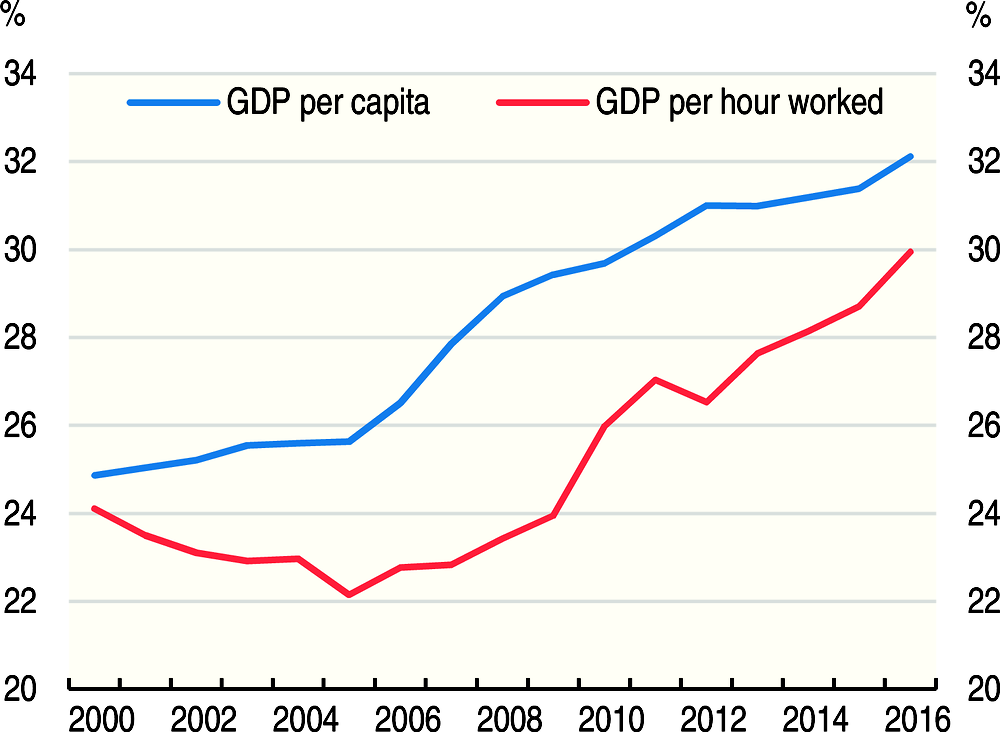
Source: OECD, Productivity Database.
Open trade and foreign direct investment are an integral part of Costa Rica’s successful growth model. This has underpinned Costa Rica’s structural transformation from an agricultural-based economy to one with a more diversified structure that is integrated into global-value chains. Building on these achievements, Costa Rica has the opportunity to increase its specialisation in medium- and high- technological intensive sectors. Robust growth of around 3.7% is projected for 2018 and 2019: a low inflation environment will protect household income and exports will benefit from the global economic recovery. Public investment is also expected to strengthen from its historically-low levels owing to ongoing large infrastructure programmes.
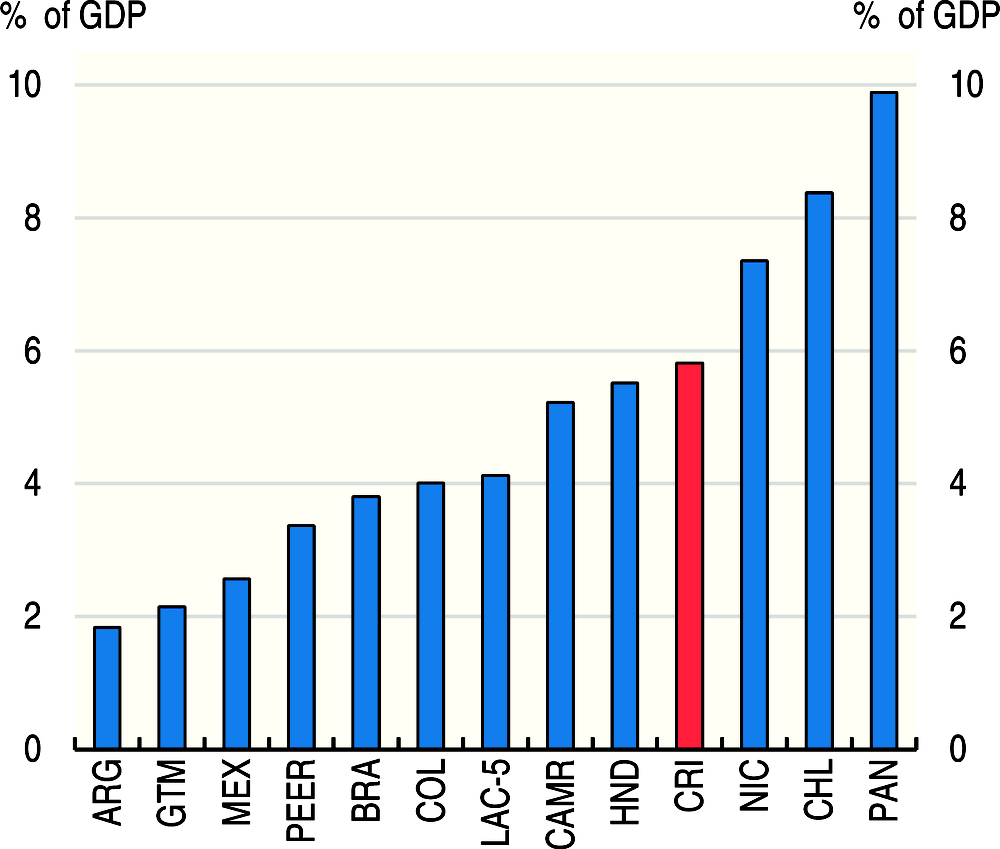
Source: World Bank Development Indicators.
However, anti-competitive regulations and high labour market segmentation hinder the full realisation of opportunities to make growth more inclusive. Employment growth is also stagnant and unemployment remains above pre-crisis levels, hitting predominantly youth and the low skilled. As a result, and against the general trend in Latin America, informality and inequality are increasing.
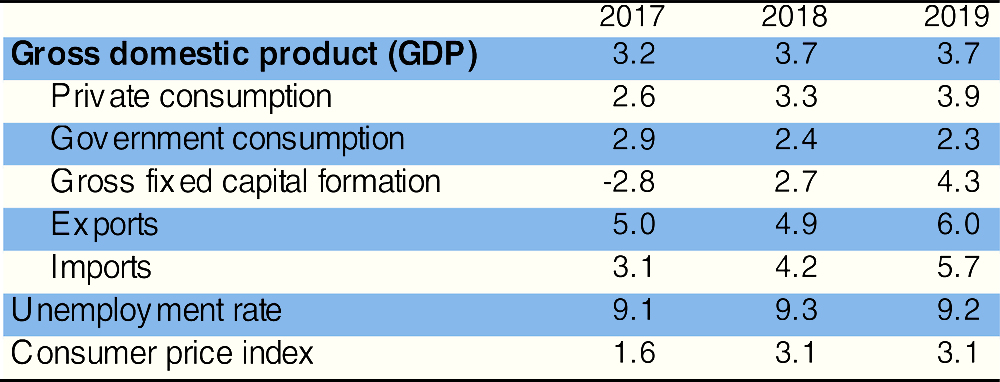
Source: OECD Economic Outlook Database.
Restoring fiscal sustainability is a priority
The fiscal stimulus imparted in 2009 to support the economy as the global crisis unfolded has not been reversed, in spite of a quick recovery and steady growth thereafter. The budget deficit has exceeded 5% of GDP for the past five years. Recent efforts to increase tax collection have not reduced the budget deficit due to the extensive use of earmarking, public sector fragmentation into autonomous agencies and spending mandates. As a result, central government debt has soared, from less than 25% of GDP in 2008 to 49% in 2017.
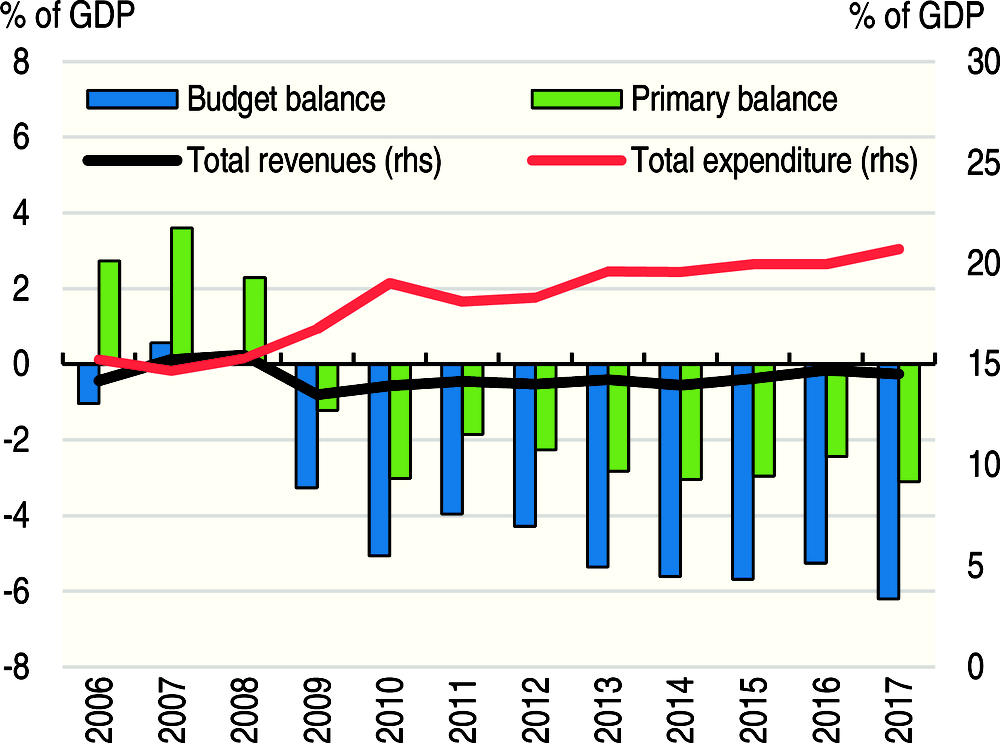
Source: Ministerio de Hacienda.
A comprehensive fiscal reform package is needed to stabilise the debt-to-GDP ratio. There is ample room to raise additional revenue by broadening the tax base and continuing to fight tax evasion and avoidance. However, raising tax revenue will not help to contain the deficit unless strong earmarking is restricted. The government should also regain control of resource allocation, including by addressing institutional fragmentation. Reforming public-sector compensation, strengthening the budgetary framework with a new, operational fiscal rule and improving debt management would help to balance the budget.
Strengthening monetary policy and financial stability
Monetary policy has successfully achieved low inflation, but challenges remain to further reduce dollarization and strengthen the financial sector. Around 40% of deposits and credits are denominated in foreign currencies, and around 70% of such credits have been extended to unhedged borrowers. The Central Bank has raised the policy interest rate to incentivise savings in local currency and prudential regulation measures have been taken to discourage borrowing in foreign currency. The impact of these measures needs to be carefully assessed and authorities should consider the possibility of also strengthening prudential regulation with a view to continuing to reduce dollarization. Institutional reforms to enhance the independence of the Central Bank should be approved.
While the banking sector appears to be healthy, recent difficulties in two state-owned banks highlight weaknesses in governance. The government should improve the selection of board appointees to state-owned banks and other public enterprises. Opening entry to FinTech start-ups, with appropriate regulation, would boost competition and reduce the high cost of financial intermediation.
Making growth more robust and more inclusive
Productivity growth has gained some momentum over the past decade, but many institutional obstacles are hampering stronger growth and spreading of its gains more widely. Obstacles include labour market marginalisation, restrictions to competition and low outcomes and inequities in education. If Costa Rica does not address these challenges, it risks becoming stuck in a “vicious cycle” whereby individuals with low skills and poor access to opportunities are confined to low-productivity and low-wage jobs. Setting in motion a “virtuous cycle” will require reforms across several policy areas that present win-win opportunities to boost both productivity and inclusion.
Childcare provision is low and differs largely across income levels and geographical areas. These asymmetries impact negatively both on the future educational outcomes of children from disadvantaged backgrounds and on female labour market participation, also hampering equity. Expanding early childhood education and care for low-income groups and improving its quality should become a priority. To facilitate the improvement and expansion of services, all spending on early childcare education and care should be classified under the constitutionally-mandated spending on education and a single agency with clear responsibility for delivering national ECEC policy across the entire sector should be appointed.
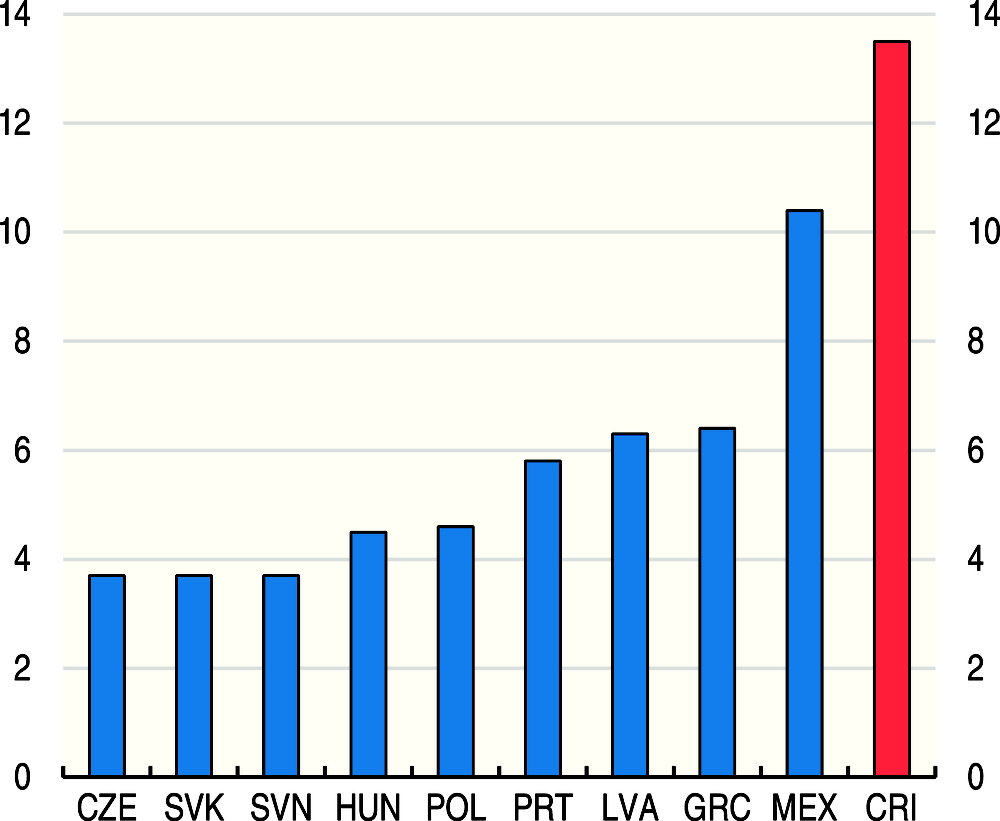
Source: OECD Income Distribution Database.
About 43% of workers hold informal jobs. High informality is a source of persistent inequalities and is also a drag on productivity. The complex minimum wage structure increases firms’ compliance costs, discouraging job formalisation. The government has reduced the high number of minimum wages from 25 to 23 and plans further reductions to 10 by the end of 2019. Moving to a smaller number of categories, based on geographical and age differentiation, rather than the current complex web of sectoral, occupation, education attainment and skill categories, would significantly reduce compliance costs.
In spite of high education spending, outcomes are poor
Costa Rica has a strong commitment to education as a social and economic development measure. At 7.9% of GDP, education spending is higher than in all OECD countries. However, spending is inefficient both in the learning process and in reducing inequality. PISA results reveal that one third of students lack core competencies and outcomes are strongly influenced by socio-economic background. Grade repetition and drop-out rates are high. Resources need to be channelled and even reallocated to secondary education and early childhood education and care. More focused, targeted support should be given to students at risk early on. Resources should also focus on providing initial and on-the-job training to teachers as well as education materials, which are currently in shortage. Developing good quality dual vocational education and training in secondary education would offer young people strong skills and a close link to the labour market. Overall, the government should move from the current focus on resources and funding to outcomes, and should establish clear and verifiable performance-based targeting against which to measure the success of its education policies.
Overly complex regulations are holding back entrepreneurship
Product market regulations are stringent; there are large barriers to entrepreneurship, extensive anti-trust exemptions and high state control in many sectors. The potential productivity gains from reducing anti-competitive regulations are large. Improving state-owned enterprises’ governance according to OECD standards, establishing one-stop shops for business registration and licensing, streamlining insolvency procedures, removing anti-trust exemptions and enhancing trade facilitation would bring large growth benefits.
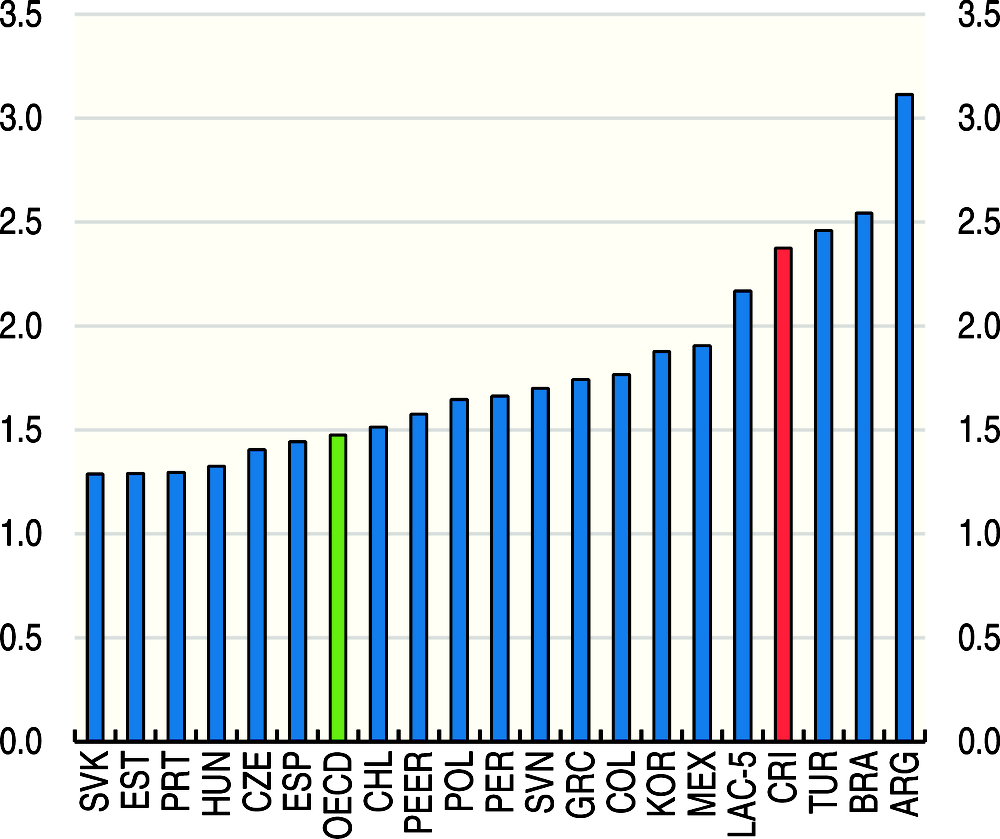
Source: OECD-WBG Product Market Regulation Database for all LAC countries except Brazil, Chile and Mexico; OECD Product Market Regulation Database.
